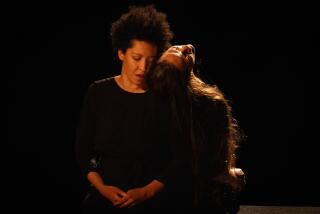Simone Unleashes Full Range of Talents
- Share via
Although many view her as the very definition of the word, the title “diva” doesn’t quite do it in reference to Nina Simone. It helps to add one of her earlier appellations, “High Priestess of Soul,” and the picture becomes more complete if other descriptions--”griot,” “sorceress,” “singer,” “storyteller,” “composer” and “passionate social activist”--areadded.
Even that range of designations doesn’t quite cover Simone in action, however, an experience that has as much to do with a soul-stirring, spirit-raising, shamanistic ritual as it does with a mere program of music. Her performance at the Wiltern Theatre on Thursday night before a packed, ecstatically responsive audience, was a case in point.
In her earlier years, Simone balanced her more effusive qualities with passages of extraordinary minimalism. Best example: her hit version of “I Loves You Porgy.” And there are times, even now, when she can reduce her dynamics and her attitude to a minimum, with stunning results. But that wasn’t what this concert, her first L.A. appearance in years, was all about.
Facing a crowd determined to shriek, shout and interact with virtually every phrase, Simone gave them what they wanted to hear: a dramatically intense performance, presented with regal assertiveness, underscored by a subtext of the anger against American society that has made her an expatriate for decades.
But even within this relatively narrow stylistic framework, Simone’s essential artistry led her to find ways to hone her lines with small but powerful subtleties. She sang the moving spiritual “Every Time I Feel the Spirit” as a touching tribute to Paul Robeson. She demonstrated her enormous versatility by alternating George Harrison’s “Here Comes the Sun” with Bob Dylan’s “Just Like a Woman” (changing the last line--to a roar of audience response--to sing “but I don’t break, because I’m not a little girl”), the folk song “Black Is the Color” and her own insightful resetting (in South Carolina) of the Brecht-Weill classic “Pirate Jenny.”
Simone’s still-powerful voice and precisely supportive piano playing (a talent of hers that is too little acknowledged) made her “Four Women” into a gripping theatrical cameo. And the renderings of “Get Up, Stand Up” and “My Baby Just Cares for Me” brought the whooping and hollering crowd to its feet.
Her daughter--who uses the single name Simone--joined her for a pair of numbers, and she was superbly accompanied by her longtime musical associates, music director Al Schackman, guitar and vibes; Paul Robinson, drums; Leopoldo Fleming, percussion; Tony Jones, bass; and Javier Collados, keyboards.
But she could have come on to a stage with nothing more than her piano as a companion and the crowd would have been just as pleased, the music no less assertive and challenging.
“Diva” may not be quite sufficient to describe her artistry, but until someone comes up with a more expansive emblem, it’ll have to do. And no one is more richly deserving of the title, in all its aspects, than Nina Simone.
More to Read
The biggest entertainment stories
Get our big stories about Hollywood, film, television, music, arts, culture and more right in your inbox as soon as they publish.
You may occasionally receive promotional content from the Los Angeles Times.










